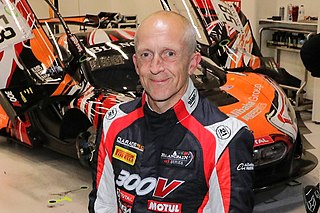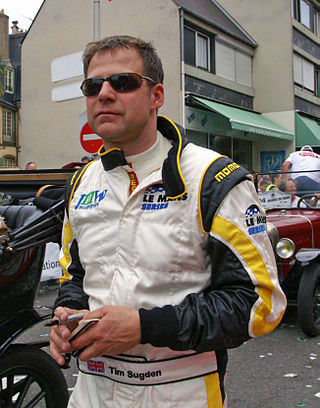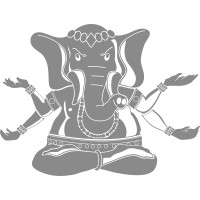
Timothy Richard "Tiff" Needell is a British racing driver and television presenter. He is a presenter of Lovecars, and formerly served as co-presenter of Top Gear and Fifth Gear.

The Lister Storm was a homologated GT racing car manufactured by British low volume automobile manufacturer Lister Cars with production beginning in 1993. The Storm used the largest V12 engine fitted to a production road car since World War II, a 7.0 L Jaguar unit based on the one used in the Jaguar XJR-9 that competed at the 24 Hours of Le Mans. Due to the high price of the vehicle at £220,000, only four examples were produced before production of the road-going Storm ceased. Only three Storms survive today, although the company continues to maintain racing models. The Storm was claimed to be the fastest four-seat grand tourer during the 1990s and early 2000s.
Steve O'Rourke was an English music manager and racing driver. He was the manager of Pink Floyd, a position he held from 1968 until his death. Among his accomplishments was negotiating Pink Floyd's split with bass player and main songwriter Roger Waters.

The McLaren F1 GTR is the racing variant of the McLaren F1 sports car first produced in 1995 for grand touring style racing, such as the BPR Global GT Series, FIA GT Championship, JGTC, and British GT Championship. It was powered by the naturally aspirated BMW S70/2 V12 engine. It is most famous for its overall victory at the 1995 24 Hours of Le Mans where it won against faster purpose-built prototypes in very wet conditions. The F1 GTR raced internationally until 2005 when the final race chassis was retired.
David Price Racing was a British motor racing team, founded by David Price. The team competed in various forms of motorsport from their foundation in 1976 until 2008. The team was sold in April 2009, but continued racing in GP2 and GP2 Asia Series under the name David Price Racing until 2010.

The Panoz Esperante GTR-1 was a race car developed by Panoz Auto Development and Reynard Motorsport for grand tourer endurance racing in 1997. Although named after the Panoz Esperante roadster, the GTR-1 actually bore no mechanical relation to the production Esperante, instead sharing only minor styling points. Only two road-legal GTR-1s were built to meet homologation requirements set forth by the ruling bodies which the racing cars ran under.

Jamie Oliver Campbell-Walter is a British professional racing driver. He was born in Oban, Scotland on 16 December 1972. He won the FIA GT Championship in 2000 and took a World Endurance Championship title in 2013 as an Aston Martin Racing factory driver. He now owns and runs Bullet Sports Management with business partner and former team-mate Nicolas Minassian.
Jetalliance Racing is an Austrian racing team which currently competes in the FIA GT Championship. Founded by Lukas Lichtner-Hoyer, former CEO of Jetalliance airlines, in 2006 under the name Race Alliance Motorsport, the team has run two privateer Aston Martin DBR9s in FIA GT as well as making appearances in other racing series. Lichtner-Hoyer is one of the team's four drivers, joined by Karl Wendlinger, Ryan Sharp and Alex Müller.
Michael Bentwood is a British auto racing driver. After starting racing in Karting, he entered the 1994 Formula First Winter Series, finishing the season in tenth. In 1995 he finished fifth in the Formula Vauxhall Junior Winter Series. He then spent four years between 1997 and 2000 in the British Formula 3 Class A Championship where he finished the highest placed British driver in the year 2000; winning the Raymond Mays Trophy and the BRDC Spencer Charrington Trophy. He was also awarded BRDC membership. He was proposed by Johnny Herbert and second by John Cardwell. The years of ultra competitive Formula 3 were followed in 2001 with a drive in the Euro Formula 3000 Series where he finished the season in twelfth place with a handful of top six finishes.

Stephen Christopher Goodwin is a British auto racing driver. Currently he works as Expert High Performance Test Driver for Aston Martin. Additionally he manages the racing career of Bruno Senna and continues to race in International GT Endurance events. He was also TV commentator on F1 for ESPN Star Sports for nearly ten years and occasionally still appears on EPS&M and other networks such as ITV.

Timothy Philip Sugden is a British racing driver. He is both driver and manager for his own racing team, Tim Sugden Motorsport.
United Autosports is a sports car racing team based in Wakefield, England, United Kingdom, founded by businessman Zak Brown and former driver Richard Dean.

The EMKA Aston Martin was a Group C racing car built for EMKA Production's owner Steve O'Rourke by Michael Cane Racing and powered by an Aston Martin engine. The EMKA C83/1 was initially introduced in 1983 and competed in the 1983 24 Hours of Le Mans, finishing 17th overall. The car was modified for 1985 and raced at the 1985 24 Hours of Le Mans, finishing in 11th place after briefly leading the race in the opening hours.

Nicholas Leventis is a retired British racing driver and founder of Strakka Racing. One of his most memorable successes was winning the 2010 24 Hours of Le Mans in the LMP2 category with Danny Watts and Jonny Kane, breaking five records in the process.

Ahmad Al Harthy is an Omani racing driver. He won the 2012 Porsche Carrera Cup Great Britain Pro-Am 1 Championship and in 2017 became the Blancpain Endurance Cup Pro-Am Champion along with British team-mate Jonny Adam.
Fabien Giroix is a French racing driver from Saint-Maur-des-Fossés, Paris.

Lanzante Limited is a British automotive company specializing in service restoration and development of unique vehicles, while also participating in auto racing in both modern and historic guises under the Lanzante Motorsport title.

Andrew Robert Watson is a British racing driver from Northern Ireland currently competing in the British Touring Car Championship for Toyota Gazoo Racing UK.

Gabriele Gardel is a Swiss racing driver. He is the 2005 FIA GT Champion.

Group GT1, also known simply as GT1, was a set of regulations maintained formerly by the Fédération Internationale de l'Automobile (FIA), for Grand Tourer racing. The category was first created in 1993, as the top class of the BPR Global GT Series, and was included in the 24 Hours of Le Mans. It fell under FIA regulation from 1997, after the BPR series came under the control of the FIA, becoming known as the FIA GT Championship. The category was dissolved at the end of 2011. The category may be split into four distinctive eras, from its debut in 1993–1996, 1997–1998, 2000–2009, 2010–2011.